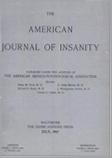LIFE SITUATION TESTS AS AIDS IN PSYCHIATRIC PROGNOSIS
Abstract
1. The scores obtained with a set of three "life situation tests" in an unselected group of 233 patients correlate closely with the average length of residence in the community. No correlation was found in the manic-depressive group of patients.
2. The high degree of correlation suggests that validity may be claimed for the tests.
3. The tests may be said to be reliable and to yield similar or parallel scores if repeated from three to six months after the original application.
4. The test scores seem to afford a fairly valid basis for predicting the probability of continuous residence in the community after discharge from the hospital.
Access content
To read the fulltext, please use one of the options below to sign in or purchase access.- Personal login
- Institutional Login
- Sign in via OpenAthens
- Register for access
-
Please login/register if you wish to pair your device and check access availability.
Not a subscriber?
PsychiatryOnline subscription options offer access to the DSM-5 library, books, journals, CME, and patient resources. This all-in-one virtual library provides psychiatrists and mental health professionals with key resources for diagnosis, treatment, research, and professional development.
Need more help? PsychiatryOnline Customer Service may be reached by emailing [email protected] or by calling 800-368-5777 (in the U.S.) or 703-907-7322 (outside the U.S.).



